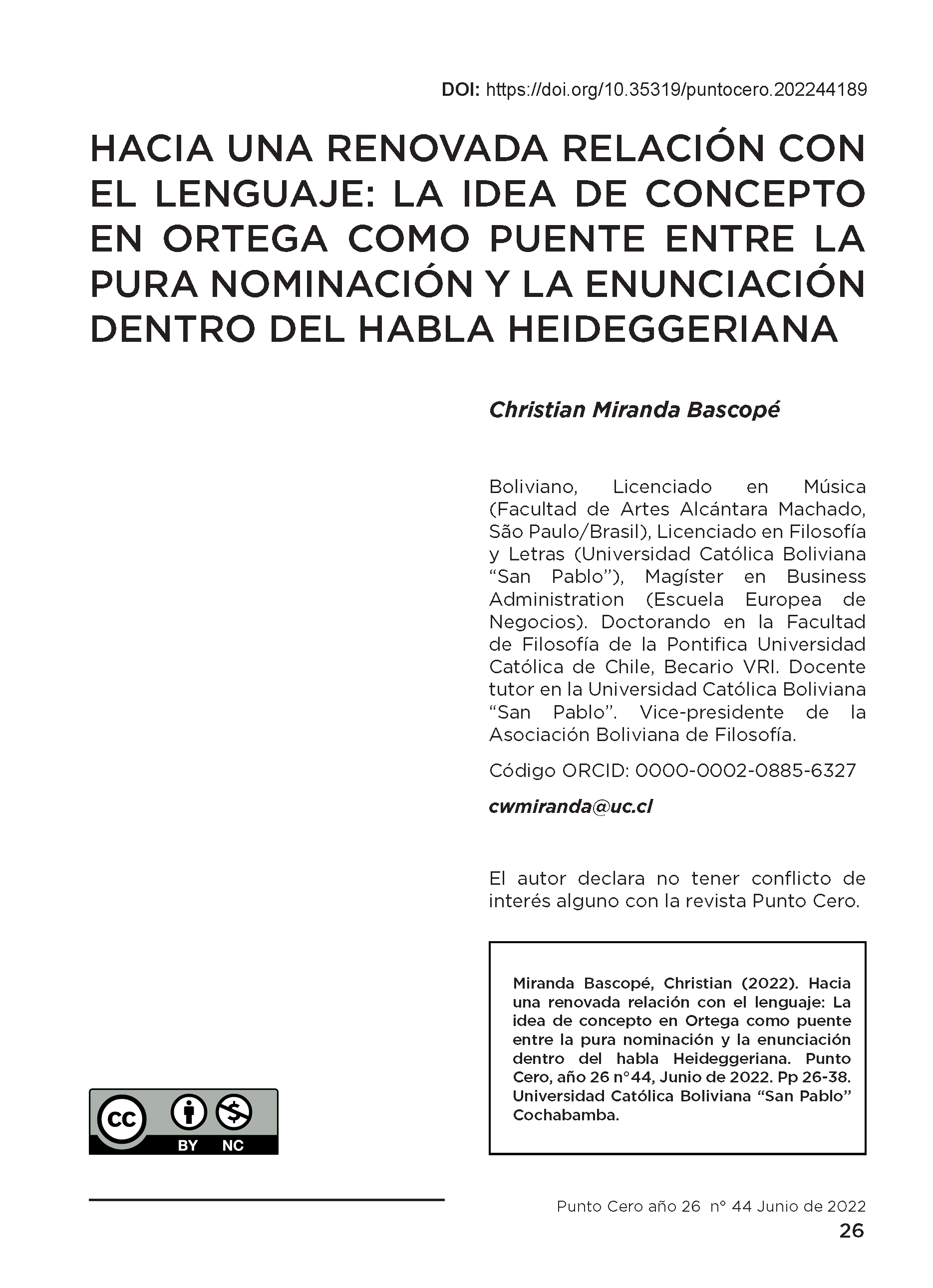Towards a renewed relationship with language: Ortega’s idea of concept as a bridge between pure nomination and enunciation within Heideggerian speech
DOI:
https://doi.org/10.35319/puntocero.202244189Keywords:
Language, Communication, Heidegger, Ortega y GassetAbstract
This work tries to make a philosophical bridge between the merely instrumental conception of language and that conception that understands speech from a much more essential and original sense. From the philosophical reflections of Martin Heidegger and José Ortega y Gasset, a path is proposed which allows generating a new relationship with language, and therefore with communication in its full sense. In this way, this work tries to build a philosophical link between Heidegger’s poetic language and an instrumental language built from it; an instrumental language that incorporates the naming power of Heidegger’s speech, but at the same time “descends” that ontological power to a communicative level. Ortega’s idea of “concept” will serve as the basis for building this contact and philosophical dialogue around language.
References
Acevedo, J. (2013). Acerca del lenguaje y la comunicación entre los hombres, según Ortega y Gasset. Gaceta de Psiquiatría Universitaria, 9 (4), 350- 356.
Barral, F. (2004). Poesía como Lenguaje más propio del Pensamiento [Tesis de Maestría]. Universidad de Chile.
Barral, F. (2004). Poesía como Lenguaje más propio del Pensamiento [Tesis de Maestría]. Universidad de Chile.
Cruz, J. (2007). Ortega ante el lenguaje. Universidad de Navarra.
Gutiérrez Pozo, A. (2012). Filosofía y poesía en sentido postrágico: Ortega, Heidegger y Adorno. Kriterion, 125, 231-250. DOI: https://doi.org/10.1590/S0100-512X2012000100011
Heidegger, M. (1967). Sein und Zeit. Max Niemeyer Verlag.
Heidegger, M. (1997). Ser y Tiempo. Editorial Universitaria.
Heidegger, M. (2000). GA 7. Vorträge und Aufsätze. Vittorio Klostermann.
Heidegger, M. (2001). Conferencias y artículos. Editorial del Serbal.
Heidegger, M. (2002). Serenidad. Ediciones del Serbal.
Heidegger, M. (2015). De la esencia de la verdad. Herder.
Heidegger, M. (2017). Filosofía, Ciencia y Técnica. Editorial Universitaria S.A.
Leconte, M. (2015). El habla habla. El Heidegger del pensar onto-histórico y la pregunta por el origen de la significación lingüística. Areté, 27 (2), 267-278.
Martínez Silva, J. (2011). Heidegger y el lenguaje: posibilidades de superar la concepción instrumental impuesta por la técnica moderna [Tesis de Maestría]. Universidad de Chile.
Nietzsche, F. (2002). Crepúsculo de los ídolos. Alianza Editorial.
Ortega y Gasset, J. (1964). Obras Completas 7. Revista de Occidente.
Ortega y Gasset, J. (1965a). Obras Completas 8. Revista de Occidente.
Ortega y Gasset, J. (1965b).Obras Completas 9. Revista de Occidente.
Ortega y Gasset, J. (1966). Obras Completas 1. Revista de Occidente.
Rodríguez Gonzaléz, M. (1990). El pensador y el poeta. Sentidos del otro pensar, según Heidegger. Anales del Seminario de Metafísica de la Universidad Complutense de Madrid, 24, 27-46.
Rodríguez, R. (2006). Heidegger y la crisis de la época moderna. Editorial Síntesis S.A.

Downloads
Published
How to Cite
Issue
Section
License
Copyright (c) 2022 Revista Punto Cero

This work is licensed under a Creative Commons Attribution-NonCommercial 4.0 International License.








